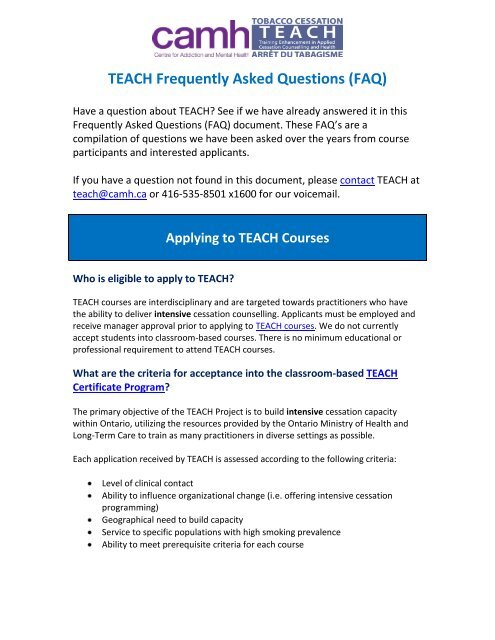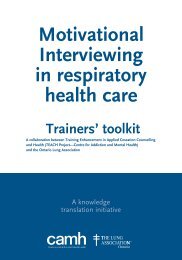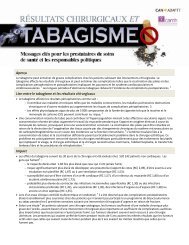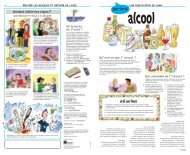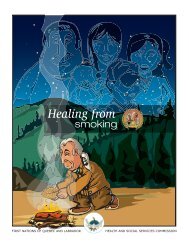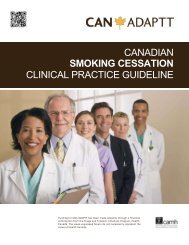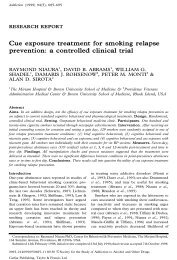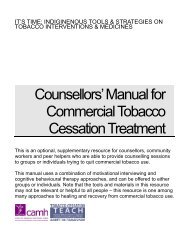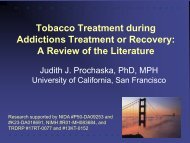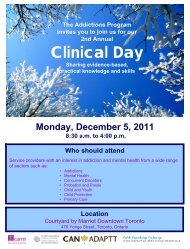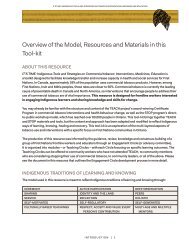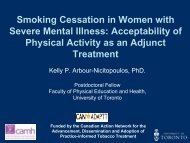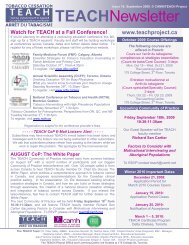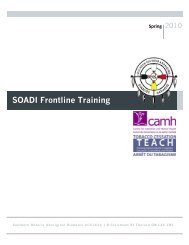TEACH FAQ 2013.pdf - CAMH - Nicotine Dependence Clinic
TEACH FAQ 2013.pdf - CAMH - Nicotine Dependence Clinic
TEACH FAQ 2013.pdf - CAMH - Nicotine Dependence Clinic
Create successful ePaper yourself
Turn your PDF publications into a flip-book with our unique Google optimized e-Paper software.
<strong>TEACH</strong> Frequently Asked Questions (<strong>FAQ</strong>)<br />
Have a question about <strong>TEACH</strong> See if we have already answered it in this<br />
Frequently Asked Questions (<strong>FAQ</strong>) document. These <strong>FAQ</strong>’s are a<br />
compilation of questions we have been asked over the years from course<br />
participants and interested applicants.<br />
If you have a question not found in this document, please contact <strong>TEACH</strong> at<br />
teach@camh.ca or 416-535-8501 x1600 for our voicemail.<br />
Applying to <strong>TEACH</strong> Courses<br />
Who is eligible to apply to <strong>TEACH</strong><br />
<strong>TEACH</strong> courses are interdisciplinary and are targeted towards practitioners who have<br />
the ability to deliver intensive cessation counselling. Applicants must be employed and<br />
receive manager approval prior to applying to <strong>TEACH</strong> courses. We do not currently<br />
accept students into classroom-based courses. There is no minimum educational or<br />
professional requirement to attend <strong>TEACH</strong> courses.<br />
What are the criteria for acceptance into the classroom-based <strong>TEACH</strong><br />
Certificate Program<br />
The primary objective of the <strong>TEACH</strong> Project is to build intensive cessation capacity<br />
within Ontario, utilizing the resources provided by the Ontario Ministry of Health and<br />
Long-Term Care to train as many practitioners in diverse settings as possible.<br />
Each application received by <strong>TEACH</strong> is assessed according to the following criteria:<br />
Level of clinical contact<br />
Ability to influence organizational change (i.e. offering intensive cessation<br />
programming)<br />
Geographical need to build capacity<br />
Service to specific populations with high smoking prevalence<br />
Ability to meet prerequisite criteria for each course
How do I apply to <strong>TEACH</strong> Certificate Program courses<br />
Applications for the <strong>TEACH</strong> Certificate Program are submitted online via the <strong>TEACH</strong> website.<br />
Each time you apply for a course you must complete the full online application. Applications<br />
open approximately eight weeks prior to each Certificate Program offering.<br />
Am I automatically registered in <strong>TEACH</strong> courses after submitting the<br />
application form<br />
No, all applications are subject to a review process. Participants will be notified regarding<br />
the status of their application (i.e. accepted or declined) approximately two weeks after<br />
online applications close.<br />
Can I edit my online application form after I have submitted it<br />
No, once your application has been submitted you may not make edits to it. Please ensure<br />
that your application is complete and has been thoroughly reviewed prior to submitting it<br />
online. Each applicant will receive an emailed copy of the application to the email address<br />
provided in the application for your own records.<br />
Is the 50-100 word paragraph I am required to provide on my <strong>TEACH</strong><br />
online Certificate Program application actually an important part of the<br />
applicant selection process<br />
Yes. Along with the selection criteria on which we assess each application, the personal<br />
statement provides us with an understanding of why you require training in intensive<br />
cessation counselling, along with how you will implement the knowledge and skills in your<br />
practice.<br />
When will I find out if I am accepted or not<br />
Participants will be notified regarding the status of their application (i.e. accepted or<br />
declined) approximately two weeks after online applications close.<br />
Does <strong>TEACH</strong> have a wait-list For which courses<br />
Since <strong>TEACH</strong> typically receives many more applications than there are spaces in our courses,<br />
we do have a wait-list.<br />
Each person who applies to the <strong>TEACH</strong> Core Course and fulfills eligibility criteria but does<br />
not make it into the course due to volume of participants will be placed on a wait-list.<br />
Should a space become available, <strong>TEACH</strong> will get in touch with applicants who are wait-
listed and offer admission. If a participant is wait-listed for the current offering of <strong>TEACH</strong>,<br />
they will receive priority for the next upcoming <strong>TEACH</strong> training but must submit a new<br />
application. If a new application is not submitted to <strong>TEACH</strong>, priority status for the next<br />
<strong>TEACH</strong> training will not be maintained.<br />
There were three applicants to <strong>TEACH</strong> from my organization and two of us<br />
did not get in. Why do some people get accepted over others<br />
Each application is reviewed according to the following eligibility criteria:<br />
Level of clinical contact<br />
Ability to influence organizational change (i.e. offering intensive cessation<br />
programming)<br />
Geographical need to build capacity Service to specific populations with high<br />
smoking prevalence<br />
Ability to meet prerequisite criteria for each course.<br />
Further, as part of our mandate to increase Ontario-wide capacity in tobacco<br />
dependence treatment, we try to accept individuals from as many different<br />
organizations as possible, especially from those organizations who do not have any<br />
<strong>TEACH</strong> trained practitioners. It is our aim at <strong>TEACH</strong> that everyone who attends our<br />
courses will return to their organizations and disseminate the information they learned<br />
with their colleagues.<br />
Why does my manager have to approve my application<br />
It is essential that each applicant’s manager is supportive of staff pursuing and<br />
implementing tobacco dependence treatment. If there is manager support for attending<br />
<strong>TEACH</strong> training, the likelihood is greater that the applicant will be encouraged and<br />
supported in providing tobacco dependence treatment. Manager approval is, in effect,<br />
an endorsement of organizational willingness to introduce or enhance tobacco<br />
dependence treatment programming.<br />
What if I am my own manager<br />
If you are in a private practice and do not report to a superior, you can endorse this<br />
section of the form, indicating responsibility to implement tobacco dependence<br />
treatment after attending <strong>TEACH</strong>.<br />
I missed the application period because I was away. Can I submit an<br />
application after the application period closes<br />
Unfortunately due to course planning and logistics, all applications must be received<br />
during the three-week online application period. We are unable to make exceptions<br />
even if the interested individual requires meets eligibility criteria, or if <strong>TEACH</strong> training is<br />
a requirement for one’s practice.
Is <strong>TEACH</strong> available online<br />
At this time, only the <strong>TEACH</strong> Core Course is available online. This course was piloted<br />
online in February 2013. <strong>TEACH</strong> Specialty courses are not yet available online; please<br />
stay tuned to www.teachproject.ca for updates and/or please email teach@camh.ca<br />
and let us know if you would like to join our email distribution list to receive<br />
communications from <strong>TEACH</strong>.<br />
Course Withdrawal<br />
I was accepted to <strong>TEACH</strong> but quickly realized I am unable to attend for the<br />
full period. What are my options<br />
If you are enrolled in a course but are no longer able to attend, please contact <strong>TEACH</strong> as<br />
soon as possible via email at teach@camh.ca or by telephone at 416-535-8501 x1600.<br />
We appreciate notification of any course cancellations as soon as they are known, so we<br />
are able to offer a space to an eligible applicant on our wait-list.<br />
If an emergency arises and I am no longer able to attend the course I was<br />
accepted into, can I give my spot to my colleague<br />
No, <strong>TEACH</strong> has a strict no-transfer policy. Once an application is approved, the space<br />
belongs exclusively to the student who was accepted into the <strong>TEACH</strong> course, not the<br />
organization. If the student cancels, the available space will go to an applicant on our<br />
waitlist. Colleagues of the student who cancels will not be considered unless they had<br />
submitted an application to <strong>TEACH</strong> during the application period. There are no<br />
exceptions.<br />
Training Logistics<br />
Accreditation<br />
Am I considered Tobacco Treatment Specialist (TTS) certified after<br />
attending <strong>TEACH</strong>
Currently in Canada, there is no regulatory body that administers and governs Tobacco<br />
Treatment Specialist (TTS) Certification. Practitioners who attend <strong>TEACH</strong> will receive a<br />
Certificate of Completion in Continuing Education in Intensive Tobacco Cessation<br />
Interventions from the University of Toronto, NOT TTS certification. Recently, <strong>TEACH</strong><br />
received accreditation from ATTUD (Association for the Treatment of Tobacco Use and<br />
<strong>Dependence</strong>), an international organization of providers dedicated to promoting<br />
evidence-based treatment for tobacco use and dependence. Many of the tobacco<br />
dependence treatment training programs in the United States that are ATTUD<br />
accredited offer TTS Certification. However, due to the fact that no regulatory body<br />
exists in Canada to govern TTS certification requirements, <strong>TEACH</strong> cannot provide<br />
practitioners with TTS certification following completion of our certificate program. If<br />
you are a healthcare practitioner that is interested in TTS certification, please visit the<br />
ATTUD website for more information on tobacco dependence treatment training<br />
programs in the USA.<br />
How is <strong>TEACH</strong> accredited<br />
The <strong>TEACH</strong> Project certificate program is currently accredited by the following<br />
regulatory bodies:<br />
Association for the Treatment of Tobacco Use and <strong>Dependence</strong> (ATTUD)<br />
University of Toronto, Faculty of Medicine: Continuing Education and<br />
Professional Development (40.5 credits)<br />
Northern Ontario School of Medicine (NOSM): Continuing Education and<br />
Professional Development<br />
University of Ottawa, Faculty of Medicine: Continuing Medical Education<br />
College of Family Physicians of Canada MAINPRO-C (40.5 credits)<br />
Canadian Addiction Counselling Certification Federation (40.5 credits)<br />
Ontario College of Pharmacists (40.5 credits)<br />
Royal College of Dental Surgeons of Ontario (41 CEU Points: Category 1 –<br />
Core Courses)<br />
To find out how our <strong>TEACH</strong> Project Webinar Series is accredited please click here.<br />
To find out how our <strong>TEACH</strong> Project Community of Practice Series is accredited, please<br />
click here.<br />
When do I receive my Letter of Completion and/or University of Toronto<br />
(U of T) Certificate<br />
Participants of the <strong>TEACH</strong> Certificate Program can expect to receive an electronic Letter<br />
of Completion from the <strong>TEACH</strong> Project within one month following the training.
Participants can expect to receive their Certificate of Completion in Continuing<br />
Education in Intensive Tobacco Cessation Interventions from the University of Toronto, 3<br />
months following the training in the mail. The U of T certificate is only administered for<br />
full completion of all mandatory certificate program requirements. For more<br />
information on how to fulfill the <strong>TEACH</strong> Project Certificate Program’s mandatory<br />
requirements, please click here.<br />
Can I obtain a <strong>TEACH</strong>/U of T certificate if I was trained at the University of<br />
Massachusetts or the Mayo <strong>Clinic</strong><br />
Although the content, structure and format of <strong>TEACH</strong> overlaps with the University of<br />
Massachusetts and the Mayo <strong>Clinic</strong>, the programs are still very different, and the<br />
University of Toronto will not allow us to provide certificates to practitioners who have<br />
not completed all <strong>TEACH</strong> requirements. If you have been trained previously at the<br />
University of Massachusetts or the Mayo <strong>Clinic</strong>, you will still need to fulfill all <strong>TEACH</strong><br />
Certificate Program requirements if you are interested in obtaining the U of T certificate.<br />
For more information on how to fulfill the <strong>TEACH</strong> Project Certificate Program’s<br />
mandatory requirements, please click here.<br />
I am University of Massachusetts or Mayo <strong>Clinic</strong> trained and need to get<br />
recertification credits. What are my options<br />
There are many opportunities for you, which include:<br />
<strong>TEACH</strong> Certificate Program Specialty Courses – If you have already received a<br />
Certificate of Completion in Continuing Education in Intensive Tobacco Cessation<br />
Interventions from the University of Toronto, you may return to <strong>TEACH</strong> and take<br />
additional specialty courses at your own expense (i.e. pay the course fee of $500,<br />
pay for your own travel and accommodation). Unfortunately, subsidization is no<br />
longer available for Certificate Program completers returning to take a second,<br />
third or fourth specialty course. For more information regarding this new policy<br />
please click here.<br />
<strong>TEACH</strong> Lunch & Learn Webinar Series (held on a monthly basis, click here for a<br />
full course schedule and application periods)<br />
<strong>TEACH</strong> Community of Practice Webinar Series on “Process Improvement in<br />
Healthcare” (offered bi-monthly until March 2013 – please click here for more<br />
information)<br />
Program Training and Consultation Centre (PTCC), for more information please<br />
click here.<br />
CAN-ADAPTT Online Discussion Forum, register now.
Online learning and webinars, such as the University of California San<br />
Francisco Smoking Cessation Leadership Centre<br />
ATTUD Accredited training programs, for more information please click here.<br />
Am I required to write the <strong>TEACH</strong> exam in order to receive my Certificate<br />
In order to receive a Certificate of Completion in Continuing Education in Intensive<br />
Tobacco Cessation Interventions from the University of Toronto, participants attending<br />
the three day Core Course are required to complete a one hour multiple choice<br />
examination at the end of the course. Only participants who successfully pass the<br />
examination (i.e. receive a grade of 70% or higher) are eligible for a Certificate of<br />
Completion. If a participant does not demonstrate command of the program content<br />
(i.e. does not receive a grade of 70% or higher on the exam), they will not receive a<br />
Certificate of Completion. However, participants who fail the examination are allowed<br />
to retest up to two times within two years following the date of initial exam. For more<br />
information on the rewrite process please read the <strong>TEACH</strong> exam policy in further detail<br />
here.<br />
Training Costs<br />
How much does the Core Course cost<br />
The Core Course costs $150 for new applicants to <strong>TEACH</strong> who live within Ontario. The<br />
Ministry of Health and Long-Term Care covers the actual cost of this workshop for new<br />
applicants. Course registration and materials are covered, with travel and<br />
accommodation costs also covered based on organizational resources and need.<br />
If participants cancel their space after the cancellation deadline or fail to show up for<br />
the course, the $150 will not be refunded. If the new applicant to <strong>TEACH</strong> lives OUTSIDE<br />
of Ontario, the core course costs $900 plus any travel and accommodation costs.<br />
I have never attended a <strong>TEACH</strong> Specialty course. How much does a<br />
Specialty course cost<br />
For residents of Ontario: If you have NEVER attended any <strong>TEACH</strong> Specialty course, there<br />
is no cost.
For residents outside of Ontario: The cost of attending a Specialty course is $500 plus<br />
all costs associated with travel and accommodation.<br />
I have already attended a <strong>TEACH</strong> Specialty course. How much does a<br />
Specialty course cost<br />
Our new policy (effective July 1, 2012) stipulates that if you have already completed<br />
your <strong>TEACH</strong> certificate (attended the Core Course and one Specialty course),<br />
participants will be required to pay for any additional Specialty courses. If you would like<br />
to attend another Specialty course, the cost is $500 plus travel and accommodation<br />
expenses. Please see further details on the <strong>TEACH</strong> website.<br />
I do not live in Toronto. Are travel and accommodations subsidized<br />
For all participants living in Ontario, travel expenses are covered by <strong>TEACH</strong>. Participants<br />
are requiring train or air travel are responsible for booking their own travel<br />
arrangements through our travel agents upon acceptance into <strong>TEACH</strong>. Further<br />
information and details are provided upon acceptance into the course.<br />
For students who do not require train or air travel: public transportation, car mileage<br />
(42 cents/km) and parking costs will be reimbursed after the workshop. Transportation<br />
with GO Transit can be booked directly by the student and will be reimbursed after the<br />
workshop. In order to be reimbursed, The <strong>TEACH</strong> Project must receive original receipts<br />
for all costs incurred. Rental cars and valet parking will not be covered by <strong>TEACH</strong>. Please<br />
note that travel is non-refundable once booked.<br />
Accommodation costs are covered for <strong>TEACH</strong> participants who live in Ontario and<br />
greater than 60 km away from the course location, and who are attending the Core<br />
Course and/or their first Specialty course. The accommodations will be booked by the<br />
<strong>TEACH</strong> staff.<br />
Is there a funding subsidy available for out-of-province or international<br />
participants<br />
Unfortunately, <strong>TEACH</strong> is unable to provide any subsidy for any participants, including<br />
those outside of Ontario.<br />
Can my $150 fee be waived<br />
The $150 administration fee cannot be waived for any participants, including those<br />
employed at the Centre for Addiction and Mental Health.
What does “travel bursary” mean<br />
The <strong>TEACH</strong> Project is solely funded by the Ministry of Health and Long Term Care. If an<br />
organization/agency has funds that they are able and willing to contribute towards<br />
sending an applicant from their organization to <strong>TEACH</strong>, they are able to do so through a<br />
donation. These donations are used to assist in offsetting some of the costs of the<br />
program. This donation cannot be used in place of the fees associated with taking the<br />
Certificate Program.<br />
Training Logistics<br />
Does <strong>TEACH</strong> provide child care<br />
Unfortunately, <strong>TEACH</strong> does not provide childcare for participants attending the <strong>TEACH</strong><br />
Certificate Program. The <strong>TEACH</strong> Project discourages parents from bringing children to<br />
the training without prearranged supervision, however, if participants are required to<br />
bring their children to the training, it is their responsibility to find appropriate<br />
supervision for them during scheduled training hours. The <strong>TEACH</strong> project staff are not<br />
responsible for unsupervised children of the participants, and therefore, will not be<br />
liable for any resulting death or injury that might occur. <strong>TEACH</strong> also does not reimburse<br />
child care expenses.<br />
What is the difference between a dietary requirement and a dietary<br />
request<br />
A dietary requirement suggests that an individual has a pre-existing allergy and/or<br />
intolerance to certain foods (egg, nuts, milk, peanut, fish, shellfish etc.) or has<br />
maintained a long-term commitment to a specific diet (vegetarian, gluten-free, kosher,<br />
halal etc.) for religious or personal reasons. A dietary request suggests that an individual<br />
might have certain food preferences, but are not restricted from eating other foods. As<br />
a result of funding limitations, the <strong>TEACH</strong> Project is unable to accommodate dietary<br />
requests.<br />
I have a long commute home from Toronto. Can I extend my stay at the<br />
hotel<br />
Only participants that are required to travel continuously for five hours or more to their<br />
final destination will be permitted to extend their accommodation with no additional<br />
personal cost at the <strong>TEACH</strong> Project’s designated hotel for the night of the last day of the
course that they are attending. Participants who do not have five hours of travel on the<br />
final day of training may extend their stay at their own expense.<br />
When do I receive my expense reimbursement<br />
The expense reimbursement form is reviewed by the <strong>TEACH</strong> staff and processed by the<br />
Centre for Addiction and Mental Health’s finance department. The amount of time it<br />
takes for participants to receive their expense reimbursement form is dependent how<br />
quickly participants mail in their expense form and original receipts to the <strong>TEACH</strong><br />
Project office, the level of completeness and accuracy of the submitted form, and the<br />
volume of expense forms received.<br />
It generally takes three to four weeks for participants to receive their reimbursement<br />
expense cheque once it is submitted by the <strong>TEACH</strong> staff to the <strong>CAMH</strong> finance<br />
department.<br />
Can I book my own travel<br />
While the <strong>TEACH</strong> Project covers all travel expenses for participants in Ontario,<br />
participants are responsible for making their own travel arrangements. Successful<br />
applicants of the <strong>TEACH</strong> training will receive the contact information for the travel<br />
agency designated by the <strong>TEACH</strong> Project. Participants must use the designated travel<br />
agency if their method of transportation to the training site involves taking the train<br />
(excludes the GO-train) or by aircraft. Rental cars are not covered by the <strong>TEACH</strong> Project.<br />
Out of province participants (non-Ontarians) are free to book their own travel method<br />
as they will be responsible for incurring all transportation expenses.<br />
I have an important appointment during the week of <strong>TEACH</strong> that I cannot<br />
miss. Can I miss part of the course<br />
All participants are expected to attend all training days for the full day (8:30 AM – 4:30<br />
PM). Only those who attend for the full period in-class and complete all learning<br />
assessments will receive certificates of completion. If a participant is unable to attend<br />
the full training session they will not receive a certificate of completion and will not be<br />
eligible for a Certificate in Intensive Cessation Counselling from the University of<br />
Toronto’s Faculty of Medicine. The <strong>TEACH</strong> Project is responsible for adhering to strict<br />
guidelines from our accrediting bodies, so please reschedule any meeting,<br />
appointments, or other engagements to allow yourself to attend the entire course(s). If<br />
you cannot commit to attend all training days, please consider apply for the next<br />
iteration of <strong>TEACH</strong> courses.
Other <strong>TEACH</strong> Opportunities<br />
How can I join the <strong>TEACH</strong> mailing list<br />
If you are interested in learning about upcoming <strong>TEACH</strong> events and educational<br />
opportunities, we encourage you to join the <strong>TEACH</strong> mailing list. To join, please send an<br />
email to teach@camh.ca with the subject “Join Mailing List”. You will then be added to<br />
our mailing list and you will receive updates about our upcoming events such as courses<br />
and webinars along with other <strong>TEACH</strong> educational opportunities.<br />
What is the <strong>TEACH</strong> Listserv<br />
The <strong>TEACH</strong> Listserv is available to those who have completed the <strong>TEACH</strong> Core course<br />
and is part of the <strong>TEACH</strong> Community of Practice. The Listserv differs from our mailing list<br />
and allows members to engage other <strong>TEACH</strong>-trained practitioners by posting tobaccorelated<br />
information or questions to a large number of people from different disciplines<br />
and receive feedback.<br />
How can I join the monthly webinars<br />
<strong>TEACH</strong> offers an ongoing series of monthly Lunch and Learn webinars on a variety of<br />
topics related to tobacco interventions. The schedule of all monthly webinars is posted<br />
on our website under the Lunch and Learn tab, in “Course Schedule”. If you would like<br />
to apply for one of our webinars, please visit the “Apply Online”tab on our<br />
website.Upon registration, you will receive a confirmation page that will contain a link<br />
to a pre-webinar learning assessment and a link to the online webinar. The registration<br />
period for the following webinar will always open the Monday after the previous<br />
webinar has finished.<br />
Are there other trainings focused on delivering tobacco interventions I<br />
can participate in<br />
<strong>TEACH</strong> offers many other training opportunities in addition to Certificate Program,<br />
including:<br />
Monthly Lunch and Learn Webinars for physicians, Family Health Teams, and<br />
other health and allied health professionals.
The Community of Practice Webinars which offers knowledge transfer and<br />
exchange amongst health professionals in direct clinical practice.<br />
Our <strong>TEACH</strong> Store offers many resources for purchase such as the Fundamentals<br />
of Tobacco Intervention (FTI) Toolkit. The FTI is available for anyone who has<br />
completed the <strong>TEACH</strong> Certificate Program and would like to design, facilitate,<br />
build, and increase capacity of tobacco cessation programs in their organizations.<br />
Other self-directed learning can be accessed on our resources page and <strong>TEACH</strong><br />
web portal<br />
o Outside of <strong>TEACH</strong> there are also the following resources:<br />
o<br />
o<br />
o<br />
The Program Training and Consultation Centre (PTCC) offers a range of<br />
training and professional development opportunities and resources,<br />
more information at http://www.ptcc-cfc.on.ca/english/Site-Home)<br />
CAN-ADAPTT Online Discussion Forum – focusing on developing and<br />
implementing Canadian cessation practice guidelines (For new members,<br />
more information is available at http://www.can-adaptt.net/join.aspx)<br />
Ontario Tobacco Research Unit Online Course: Tobacco and Public<br />
Health: From Research to Practice: http://tobaccocourse.otru.org/<br />
Are there any publications on <strong>TEACH</strong><br />
<strong>TEACH</strong> has a recent publication in the journal of Patient Education and Counselling:<br />
Herie, M., Connolly, H., Voci, S., Dragonetti, R., Selby, P. (2012). Changing practitioner<br />
behavior and building capacity in tobacco cessation treatment: the <strong>TEACH</strong><br />
project. Patient Education and Counseling, 86 (1), pp: 49-56.


